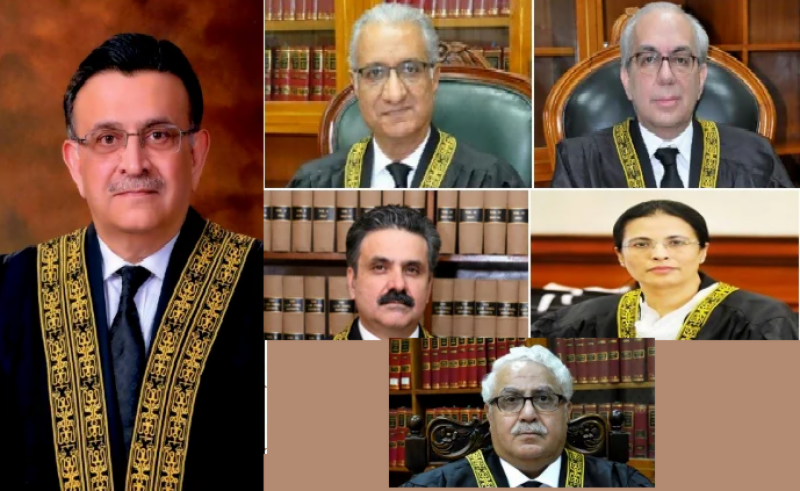Islamabad (Staff Report/Agencies): The Supreme Court (SC) on Tuesday adjourned hearing the petitions challenging the trial of civilians in military courts.
Earlier, the 6-member bench, headed by Chief Justice of Paklistan (CJP) Umar Atta Bandial, and comprising Justice Ijazul Ahsan, Justice Muneeb Akhtar, Justice Yahya Afridi, Justice Sayyed Mazahar Ali Akbar Naqvi and Justice Ayesha Malik resumed the hearing in the case.
The seven-member was dissolved for the second time on Monday after the federal government raised objections to the inclusion of Justice Mansoor Ali Shah.
During yesterday's hearing, Justice Mansoor Ali Shah recused himself after Attorney General for Pakistan (AGP) Mansoor Usman Awan submitted before the court that he had been “instructed by the federal government that the SC’s justice Shah should not be a part of the bench, citing the fact that one of the petitioners, Jawwad S. Khawaja, was related to him.
At the outset of today's hearing, Supreme Court Bar Association (SCBA) president Abid Zuberi informed the court that he had also filed a plea on the matter. He urged the court to let him present his arguments.
“We are happy to see that a plea has come from the SCBA,” the CJP remarked, adding that “good arguments” would be welcomed. Justice Bandial told Zuberi to prepare his arguments, adding that the court would come back to the plea later.
Resuming his arguments, Pakistan Tehreek-e-Insaf (PTI) chief Imran Khan's lawyer Uzair Bhandari said that a civilian could not be court-martialled.
Referring to yesterday’s press conference by the Director General (DG) Inter-Services Public Relations (ISPR), he said that the military's spokesperson Maj Gen Ahmed Sharif Chaudhry stated that 102 people would be tried in military courts.
However, the AGP Mansoor Usman Awan interjected and said, “I stand by what I said yesterday, that 102 people are not being tried.”
In Monday's hearing, the AGP had stated that the cases of 102 detained persons were at the investigation stage and it was likely that the number could reduce as their cases could be sent to normal courts after the probe was completed.
During today’s hearing, AGP Awan said that the representatives of the Ministry of Defence were also present, who would support his stance.
“We believe you,” CJP Bandial told the AGP.
In his remarks Justice Afridi said “We need to make it clear whether the accused were taken into custody under Section 2(d)(i) of the Official Secrets Act or Section 2(d)(ii).”
“Initially, they were detained under Section 2(d)(ii) but the consequences of Section 2(d)(i) may also be applicable,” AGP Awan told the court.
“What is interesting is that the allegations against the suspects are not related to the Official Secrets Act,” CJP Bandial remarked. Justice Ayesha also inquired about the criteria for deciding which court suspects would be tried in.
Uzair Bhandari also argued that Parliament could not approve civilian trials in military courts without carrying out a constitutional amendment. He said that the 21st Amendment had laid down the principle that trial of civilians required a constitutional amendment.
“If there is an aspect of internal matters, then also a civilian trial in military courts can’t be held?” Justice Ayesha asked.
Justice Afridi remarked that such matters, which related to the country’s defence, had been decided in the 21st Amendment.
Justice Ahsan remarked that the court could not ignore past examples of civilians being tried in military courts. At the same time, he said that past examples had different realities and different reasons.
Bhandari contended that any military trial of a civilian could only happen through a constitutional amendment.
In his remarks Justice Akhtar stated that a military trial could take place during an emergency or during war time. “Civilian trials cannot be conducted in military courts when fundamental rights are not suspended,” he said.
The PTI’s chief’s lawyer replied that the 21st Amendment stated that military trials could only happen when there was a war-like situation.
Bhandari contended that fundamental rights required a judge appointed under Article 175(3) to conduct the trial. “Court-martialling a civilian does not leave a good impression on the judicial system and no one has allowed it happily,” he added, adding that civilians’ military trials would cause unease in the country.
He further said that the first information reports (FIRs) against the suspects did not mention the Official Secrets Act. “The army is involved in various things, including sports. If something happens there, then will be Army Act be invoked?” he asked.
“When you talk about an army man, then the most important thing is morale. If morale is affected then it benefits the enemy. Lowering their morale is also a crime,” CJP Bandial said.
The CJP observed that army officials were ready to render sacrifices for the country due to their high morale.
Justice Ahsan added that the Official Secrets Act could only be invoked when the act had benefitted the enemy.
Justice Ayesha observed that for a trial under the Army Act, the alleged offence had to fall under the Official Secrets Act. She then asked the lawyer to inform the court about the Official Secrets Act.
Bhandari said that under the act, attacking an area that was off limits or carrying out an act that would benefit that enemy was a crime.
Justice Ayesha then said that an area that was off limits had either war plans or sensitive installations.


